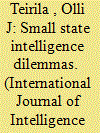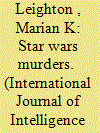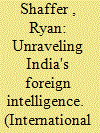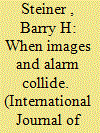| Srl | Item |
| 1 |
ID:
138815


|
|
|
|
|
| Summary/Abstract |
In January 2010, referring to the December 2009 attempted bombing of a U.S. airliner, President Barack Obama stated: “The bottom line is this: this was not a failure to collect intelligence; it was a failure to integrate and understand the intelligence that we already had.
|
|
|
|
|
|
|
|
|
|
|
|
|
|
|
|
| 2 |
ID:
138816


|
|
|
|
|
| Summary/Abstract |
Freddy was a captain in the army. He was in charge of an army post in Rojas, a coastal city, a hundred miles from my office. He loved the army. His uniform was always perfect, the brass buttons shined and his trousers properly creased. All in all, he was a handsome soldier.
|
|
|
|
|
|
|
|
|
|
|
|
|
|
|
|
| 3 |
ID:
138809


|
|
|
|
|
| Summary/Abstract |
One of the most fundamental responsibilities of a government is to ensure the security of its citizens. This may require it to act on information that it cannot disclose and to detain people who threaten national security. Yet in a constitutional democracy, governments must act accountably and in conformity with the Constitution and the rights and liberties it guarantees. These two propositions describe a tension that lies at the heart of modern democratic governance. It is a tension that must be resolved in a way that respects the imperatives both of security and of accountable constitutional governance.
|
|
|
|
|
|
|
|
|
|
|
|
|
|
|
|
| 4 |
ID:
138814


|
|
|
|
|
| Summary/Abstract |
As social networking within the rapidly expanding domain of the Internet continues to provide a forum for the uncensored expression of ideas, the Intelligence Community (IC) faces new platforms through which violent extremists communicate and threaten national security.
|
|
|
|
|
|
|
|
|
|
|
|
|
|
|
|
| 5 |
ID:
138808


|
|
|
|
|
| Summary/Abstract |
Finland's defense and intelligence establishments are living in interesting times indeed. Edward Snowden's leaks and revelations concerning the United States's National Security Agency (NSA) might not have revealed anything new or astonishing about the ancient techniques of diplomacy, but they have awakened Europeans to the reality of life with first-class superpower(s). Even in Finland an unusual amount of media and civil interest has developed towards the Intelligence Community's data and information gathering procedures, a focus made more interesting by the fact that two Finns were, in 2014, manning very high positions within the European Union's (EU) Intelligence Community. The ex-chief of Finnish Security Intelligence Service (Suojelupoliisi, SUPO), Ilkka Salmi, has been the director of European Union's Intelligence Analysis Center (INTCEN, former Situation Centre of the European Union, EU SITCEN) since February 2011.
|
|
|
|
|
|
|
|
|
|
|
|
|
|
|
|
| 6 |
ID:
138811


|
|
|
|
|
| Summary/Abstract |
During the 1980s more than two dozen computer scientists, engineers, software designers, and highly-skilled technicians representing the cream of Great Britain's crop of missile defense experts died in mysterious and often gruesome ways. Coincidence might account for the timing and circumstances of these deaths, except for one caveat: Virtually all of the victims participated in the European counterpart to U.S. President Ronald Reagan's Strategic Defense Initiative (SDI). Henry Champ, NBC News correspondent in London, put it this way: “In the world of espionage, there is a saying: Once is an accident, twice is coincidence, but three times is enemy action.”1 This maxim attests beyond a reasonable doubt that the “Star Wars” murders were not merely a chain of isolated episodes. But these serial deaths have garnered almost no public attention throughout the years.
|
|
|
|
|
|
|
|
|
|
|
|
|
|
|
|
| 7 |
ID:
138810


|
|
|
|
|
| Summary/Abstract |
Indian intelligence has played a significant role in strengthening the nation's position since independence. Despite its importance, the public has little understanding of India's intelligence agencies as scholars and journalists have rarely probed the subject due to legal and political constraints. India's Research and Analysis Wing (usually stylized as RAW or R&AW) is the country's agency devoted to foreign or “external” intelligence.
|
|
|
|
|
|
|
|
|
|
|
|
|
|
|
|
| 8 |
ID:
138812


|
|
|
|
|
| Summary/Abstract |
More than 40 years ago, Columbia University's Robert Jervis argued that political officials “are apt to err by being too wedded to the established view and too closed to new information, as opposed to being too willing to alter their theories. He emphasized this theme still more strongly in later work. “It is striking,” he wrote in 1976, “that people often preserve their images in the face of what seems in retrospect to have been clear evidence to the contrary. We ignore information that does not fit, twist it so that it confirms, or at least does not contradict, our beliefs, and deny its validity.
|
|
|
|
|
|
|
|
|
|
|
|
|
|
|
|